Vietnamese businesses utilise AI to increase competitiveness
With the theme “Vietnam’s competitiveness in the age of AI and new world order”, more than 120 top executives and tech leaders discussed the pros and cons of applying AI in their businesses.
Professor Tung Bui, director of the University of Hawaii Executive MBA in Vietnam, shared that Vietnam needs to enhance its ability to compete internationally as the country accelerates its global integration amid unprecedented challenges. These include power struggles between China, the United States, the European Union, and Japan, with unpredictable tariff wars, and the uncertain effects of climate change. There are two outstanding issues when applying AI: cost and benefit.
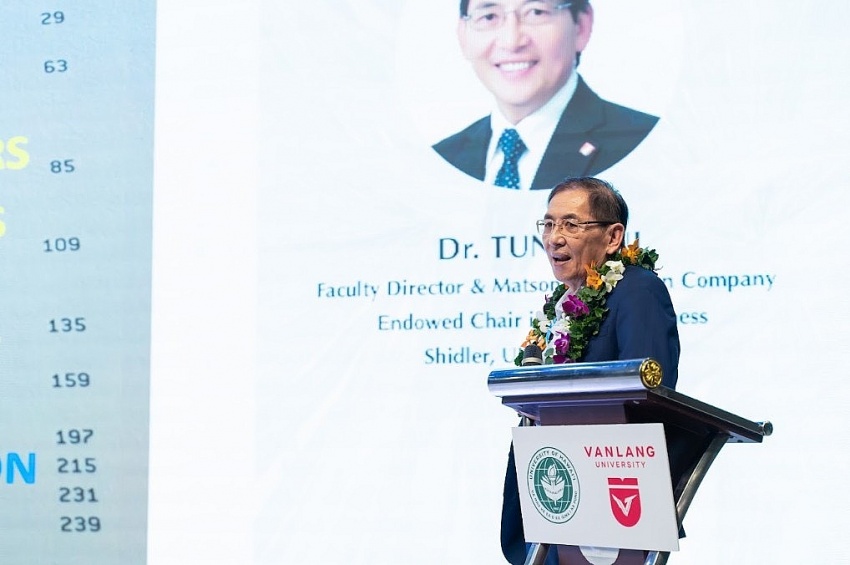 |
| Professor Tung Bui, director of the University of Hawaii Executive MBA in Vietnam |
“We need to clearly determine how much we plan to spend on applying AI and what benefits we will gain, which is a question any business must find the answer to,” Bui told VIR.
“AI currently has two main impacts on businesses, which are how to use AI to reduce operating costs and increase sales and revenue,” Bui said.
According to Prof. Bui, for example, AI can help businesses better understand their markets, and monitor how when customers receive and use products. AI can conduct sentiment analysis, which in turn can help businesses set appropriate prices that satisfy customers. From this, they can increase their revenues.
“To be able to compete globally, Vietnamese businesses need to clearly know their advantages and disadvantages of AI, and focus on the positives,” Bui said.
“One of the reasons that multinational companies are concerned about Vietnam is that country’s production system is considered inferior to China's in terms of machinery, risk controls, and human capacity. AI will help reduce these concerns,” he said.
Talking with VIR, Dr. Vance Roley, dean of the Shidler College of Business of the University of Hawaii and faculty leaders of Van Lang University, commented that AI has the potential to transform the workplace by improving onboarding and efficiency. AI can also be used to evaluate company soundness and predict financial outcomes, but it has limitations in certain areas. Training and education are crucial to prepare workers for the impacts of AI.
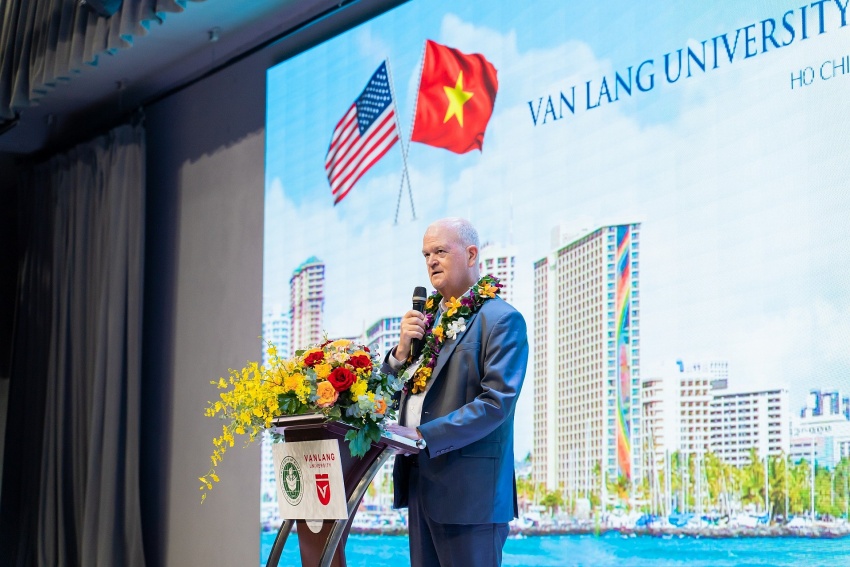 |
| Dr. Vance Roley, dean of the Shidler College of Business of the University of Hawaii and faculty leaders of Van Lang University |
An AI workforce training programme should be a new initiative for enterprises, in collaboration with universities, Roley said.
Vietnam is already a leader in software, and is also on the cutting edge of AI. AI will transform the workplace pretty quickly in Vietnam, and it's going to lead to greater efficiencies and allow people to be more creative. We do not necessarily need to rely on AI’s creativeness. but on its efficiencies, he said.
He added that to prepare for enterprises to implement AI, they have to invest first in generative AI products and their workforce, so they can use them productively and ethically.
“This is going to grow very quickly, and workers need to be trained how to use AI efficiently,” he said.
In the era of AI, competition centres around creating the best intelligence. It is also a race against time, as businesses that fail to adopt new technology quickly risk falling behind. Vietnam, with its strong affinity for technology, seems ready to embrace AI.
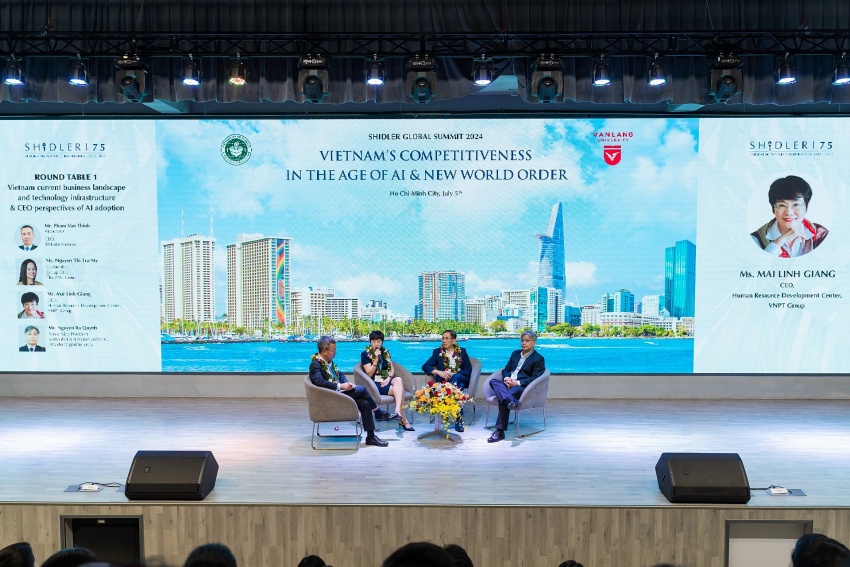 |
| The Shidler Global Leadership Summit held in Ho Chi Minh City on July 5 gathered more than 120 top business executives and technology leaders |
Being one of the leaders in the food and agriculture sector, Nguyen Thi Tra My, co-founder and Group CEO of The PAN Group, said the sector cannot stand aside from the trend of applying AI, which can promote automation, improve productivity, and effectively manage resources.
However, she added that the application of AI in agriculture also faces challenges in terms of data, investment costs, and labour.
“Combining AI with farmers' traditional experience can create a sustainable and effective agricultural model, suitable for real conditions. This not only helps increase productivity and product quality but also protects and develops natural resources and biodiversity. If we know how to collect and organise data, AI can be "trained" based on farmers' knowledge and experience, helping to maintain and pass on traditional techniques to future generations,” Tra My said.
“No matter how much technology develops, we still need close cooperation between the state, farmers, scientists, businesses, and consumers,” she added.
The Shidler Global Leadership Summit also discussed many other topics. Among those were the current business landscape and technology infrastructure in Vietnam, CEOs' perspectives on AI adoption, whether or not Vietnam's IT industry is ready for the AI era, and evaluating the impacts of AI on Vietnam’s banking and insurance, tourism and hospitality, real estate and manufacturing, and healthcare sectors.
It also mentioned the possibility of AI helping to elevate Vietnam’s agriculture and seafood competitiveness.
The Vietnam Executive MBA (VEMBA) programme at the University of Hawai’i’s Shidler College of Business offers an unparalleled opportunity for career advancement. This AACSB-accredited programme blends rigorous academic coursework with practical, hands-on learning experiences designed specifically for full-time executives. Since its inception in 2001, VEMBA has built a diverse cohort of more than 1,000 professionals from over 20 countries, providing a unique platform for networking and collaboration.
The programme's flexible hybrid format, which combines in-person and online sessions, allows participants to manage their professional commitments while pursuing their MBA. With faculty drawn from prestigious institutions and a strong alumni network, VEMBA stands out as a leading choice for those aspiring to leadership and excellence in the global business arena.
In recent years, global supply chains have been restructured to enhance resilience against various uncertainties, positioning Vietnam advantageously in a world shaped by shifting geopolitical dynamics and the emergence of generative AI.
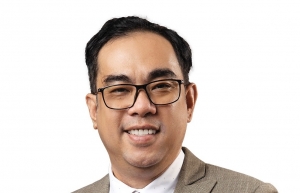 | Redefining the journalism landscape in the age of AI With the recent rise of AI, some journalists and media agencies are fearing an invasion where their journalistic work is used (sometimes without permission) as sources to generate personalised content, or to support social media users in their own quest to become opinion leaders. |
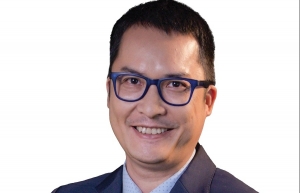 | Unveiling the media’s dynamics for the AI era The debate is ongoing as to whether AI could fully replace skilled journalists in the future. Nguyen Thanh Son, chairman of Media Ventures Vietnam Group, discussed with VIR’s Hazy Tran the impacts of related applications and the warnings and benefits of AI. |
 | AI becoming increasingly prevalent for e-payments The rising risks of cashless payment fraud have led banks to accelerate implementation of AI-driven security measures and biometric authentication to enhance transaction safety and protect consumers. |
What the stars mean:
★ Poor ★ ★ Promising ★★★ Good ★★★★ Very good ★★★★★ Exceptional
Related Contents
Latest News
More News
- State corporations poised to drive 2026 growth (February 03, 2026 | 13:58)
- Why high-tech talent will define Vietnam’s growth (February 02, 2026 | 10:47)
- FMCG resilience amid varying storms (February 02, 2026 | 10:00)
- Customs reforms strengthen business confidence, support trade growth (February 01, 2026 | 08:20)
- Vietnam and US to launch sixth trade negotiation round (January 30, 2026 | 15:19)
- Digital publishing emerges as key growth driver in Vietnam (January 30, 2026 | 10:59)
- EVN signs key contract for Tri An hydropower expansion (January 30, 2026 | 10:57)
- Vietnam to lead trade growth in ASEAN (January 29, 2026 | 15:08)
- Carlsberg Vietnam delivers Lunar New Year support in central region (January 28, 2026 | 17:19)
- TikTok penalised $35,000 in Vietnam for consumer protection violations (January 28, 2026 | 17:15)

 Tag:
Tag:




















 Mobile Version
Mobile Version